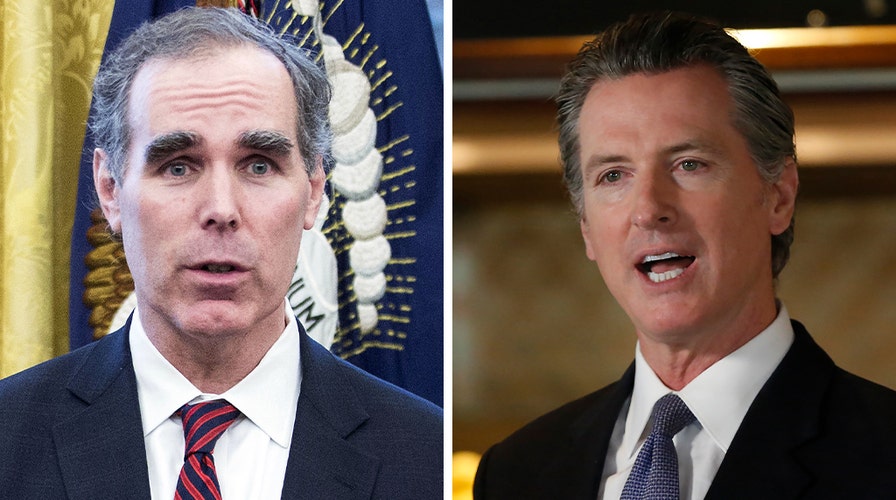Fox News Flash top headlines for May 19
Fox News Flash top headlines are here. Check out what's clicking on Foxnews.com.
In a letter to California Gov. Gavin Newsom Tuesday, a high-ranking Justice Department (DOJ) official warned that parts of the state’s coronavirus shutdown order may infringe upon religious freedoms in the Golden State.
“Simply put, there is no pandemic exception to the U.S. Constitution and its Bill of Rights,” Assistant Attorney General Eric Dreiband wrote.
He argued that the state’s shutdown treats religious gatherings differently than it treats nonreligious gatherings that may involve similar numbers of people.
“Laws that do not treat religious activities equally with comparable nonreligious activities are subject to heightened scrutiny under the Free Exercise Clause of the First Amendment,” he wrote.
CALIFORNIA GOV. NEWSOM SAYS WORKERS GETTING CORONAVIRUS ON THE JOB MAY RECEIVE WORKER'S COMP
One issue involves restrictions that prohibit socially distanced, in-person religious gatherings but still allow certain in-person, nonreligious activities.
For example, employees can report to work at entertainment industry or e-commerce jobs that enforce social distancing guidelines.
“This facially discriminates against religious exercise,” Dreiband wrote. “California has not shown why interactions in offices and studios of the entertainment industry, and in-person operations to facilitate nonessential e-commerce, are included on the list as being allowed with social distancing where telework is not practical, while gatherings with social distancing for purposes of religious worship are forbidden, regardless of whether remote worship is practical or not.”
CLICK HERE TO GET THE FOX NEWS APP
Dreiband also took issue with the state’s reopening plan, which he said will allow schools, restaurants, shopping malls and some other high-occupancy facilities to reopen in Stage 2 -- while religious services cannot resume until Stage 3. Faith-based counseling services are listed as Stage 2 operations.
According to California’s Resilience Roadmap -- the name of its plan for a gradual reopening -- Stage 2 involves “lower-risk workplaces,” while Stage 3 involves “higher-risk workplaces.”
Stage 4 is the end of the stay-at-home order altogether.
The state entered its Stage 2 on May 8, according to information on its coronavirus response website. Retail stores are allowed to offer curbside pickup and delivery only. Offices and manufacturing facilities can reopen so long as they follow state guidance on how to do so safely.
Stage 2 facilities are required to implement their own risk assessments and protection plans, train employees on how to limit the spread of COVID-19, implement disinfecting measures, screen incoming individuals and maintain physical distancing.
NEWSOM: CALIFORNIA COULD HOST PRO SPORTS AS EARLY AS JUNE, WITHOUT FANS IN STANDS
“The Department of Justice does not seek to dictate how states such as California determine what degree of activity and personal interaction should be allowed to protect the safety of their citizens,” Dreiband wrote. “However, we are charged with upholding the Constitution and federal statutory protections for civil rights. Whichever level of restrictions you adopt, these civil rights protections mandate equal treatment of persons and activities of a secular and religious nature.”
The assistant attorney general also argued that while a number of U.S. District Courts have denied temporary restraining orders against parts of the shutdown in California, other decisions around the country have made clear that “reopening plans cannot unfairly burden religious services.”
“We believe… that the Constitution calls for California to do more to accommodate religious worship, including in Stage 2 of the Reopening Plan,” he concluded.
Earlier this month, Newsom declared May 7 as a statewide Day of Prayer.
“Though houses of worship may be empty, hearts are not,” he said at the time. “We stand with all Californians who make time for prayer and reflection during these extraordinary moments.”









































